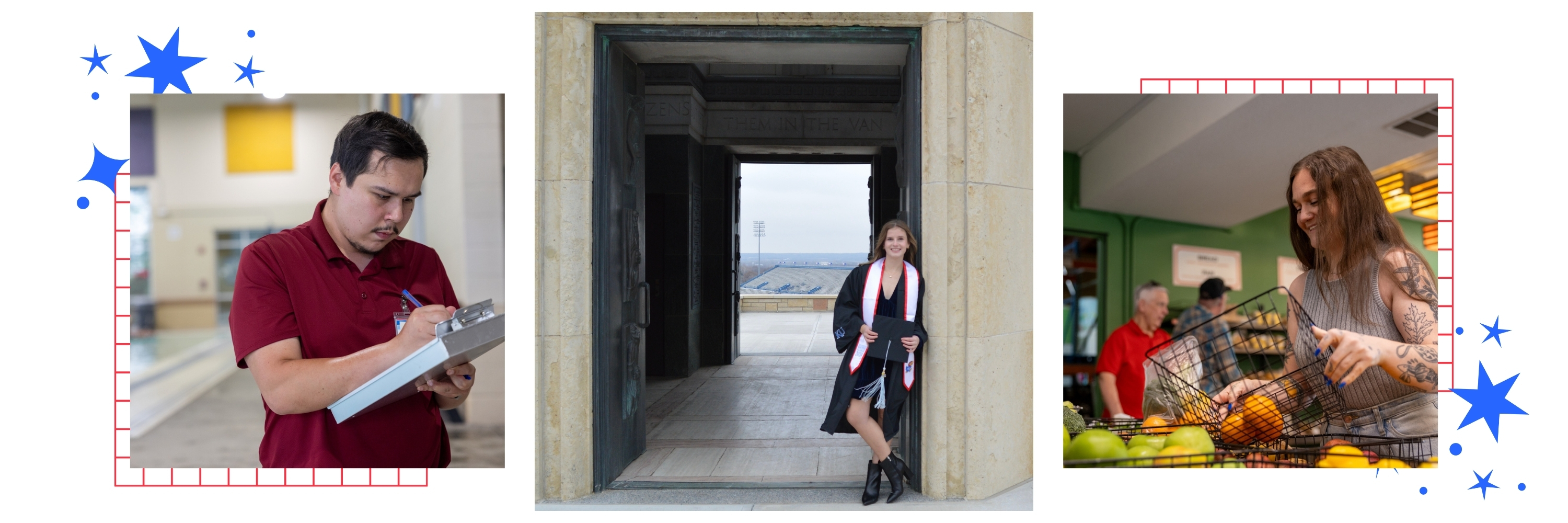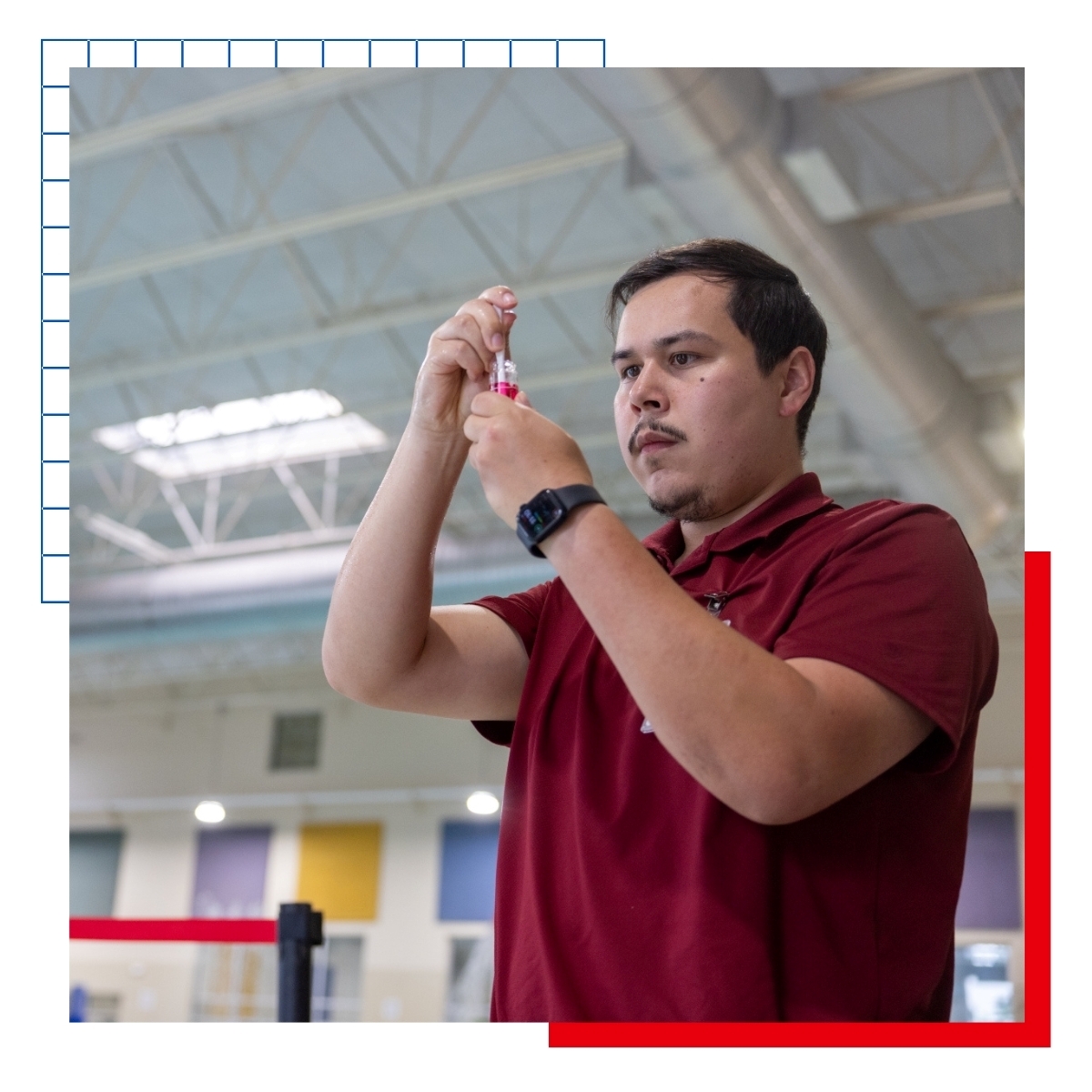Exploring the Versatility of KU's Community Health Degree: Alumni Insights
KU alumni are proving that a degree in community health opens the door to powerful, people-centered careers.

If you’re passionate about making a difference in public health, nonprofit work, healthcare or policy, the Community Health degree at the University of Kansas provides a solid foundation for a wide variety of careers. Graduates of the program have gone on to work in nutrition education, nonprofit leadership, healthcare administration, policy advocacy and beyond.
One of the greatest strengths of this degree is its versatility. Whether you’re interested in working directly with communities, shaping public policy or managing health programs, the possibilities are vast. Some alumni even use it as a stepping stone to advanced degrees in public health, occupational therapy or epidemiology.
To showcase the program’s impact, we sat down with three alumni who have taken their community health degrees in different but equally meaningful directions. Their experiences highlight how this degree opens doors to careers that serve communities in meaningful ways.
Alden Pennington, 2024 Community Health Graduate: Accepted into Occupational Therapy School
For Alden Pennington, KU’s Community Health degree was the perfect launchpad for graduate school in Occupational Therapy (OT).

“You get a very well-rounded course load in the community health program. You’re getting some science and a lot of information on the social determinants of health that apply to a lot of career paths. The program set me up to be able to look closely at the person I’m treating but also understand how their environment and overall health is affecting them.”
Alden’s internship — a program requirement — took her to Britain Development Center, a preschool providing therapy services for children with disabilities.
“I would not have found that without help from the Community Health professors,” she shares. “They go out of their way to make sure students are getting an internship that is a good fit for them. There’s even a class to help with getting that internship, where you learn about cover letters, work on resumes, interview strategies and all the things you’d need to get that internship, which is so helpful!”
She praises the hands-on learning embedded in the curriculum and notes that much of the material feels immediately applicable to a variety of careers.
“The way that so many of our classes are structured, a lot of them are hands-on, so you’re partnered with Lawrence community organizations. The real-world experience of working with a community partner, along with the personalized guidance from your professors, makes the experience so valuable.”
Alden hopes to work with resource-limited populations in her occupational therapy career. She credits KU’s program for showing her how to meet those needs.
“The skills I’ll get from OT school will be great, but the background of Community Health has shown me how to give a community what they need: we look at a community, analyze, talk to them and get the information to provide better service. That comes from my background in this program.”
Enrique Ortiz, 2021 Community Health Graduate: Environmental Health Specialist, Lawrence-Douglas County Public Health
Enrique Ortiz took his Community Health degree and built a career in public health, beginning as an intern at a local food pantry. He moved into roles in nutrition education and tobacco prevention policy before landing his latest role in environmental health.

“I think that's one of the awesome things about working in community health — it's never ending. You can learn a lot and be an expert in different fields,” Enrique says. “I’ve worked in food access, tobacco prevention, nutrition education, and now I’m helping enforce environmental codes. As an environmental health specialist, I do inspections across the city of Lawrence and the county. I’m out in the field for compliance inspections and licensing for everything from septic systems to tobacco retailers to public pools.”
His career path highlights the community outreach and service-oriented elements of KU’s community health degree. “Just knowing that I'm working with people, and bettering the lives of our community every day is by far the most rewarding aspect of working in community health.”
Enrique emphasizes the importance of engaging with faculty and community members for networking and internships, both of which helped shape his career. He notes that his success stems from relationships he built while pursuing his community health degree.
“When you reach out, you get to build connections, especially with volunteering and internships. I think I got to where I am today by utilizing those connections, and they were all connections I didn't have prior to KU.”
Jessica Cooney, 2018 Community Health Graduate: Impact Director, Just Food of Douglas County
Jessica Cooney discovered Just Food, the food bank of Douglas County, through a program evaluation class at KU. This connection led to an internship, an AmeriCorps position, and now, to her current role as Impact Director.

Her advice? Expect to wear multiple hats in the nonprofit world.
“Truly, I never have a day that is the same as a previous day. I am always doing something that I wasn't expecting to do, or something totally new,” Jessica says. She believes this is both the biggest reward and challenge of her job. “I knew that I wanted to be in some sort of public service, and I knew I wanted to be working with people. I wasn't sure what avenue that looked like, and I have found a lot of love for nonprofit program development.”
Jessica’s role allows her to see firsthand how food security impacts overall health outcomes. She’s found a passion for leading a team that is doing important work in her community, as well as nonprofit program development and advocacy.
“I oversee our staff and day-to-day programs, including nutrition education, cooking classes, gardening program, our mobile pantry and delivery program. I also handle the administrative side, such as grants and data,” she shares. “Food policy is an additional piece to my role that I’m learning and enjoying. We are getting much more involved as an organization in some advocacy work at both the state and the federal level, so I’m writing testimony for bills we’re participating in.”
Jessica credits the Community Health program for preparing her with skills in program development and evaluation. Now, she’s rewarded by witnessing the impact of these programs and their outcomes.
"I enjoyed the courses on mock program development, where we defined the population, set outcomes and planned steps to achieve them. I think the beauty of nonprofits is that it shows you what's possible. When there is funding and money to show us, ‘This is what happens when people have adequate food, or this is what happens when people have adequate access to X, Y and Z,’ painting that picture and showing the outcome is very rewarding.”

What can you do with a community health degree?
The Community Health degree at KU is a gateway to a career in public service, nonprofit leadership, healthcare or policy. If you’re looking for a degree that combines health, policy, community service and program development, KU’s Community Health program might be the right fit for you.
For students who are undecided about their career path, Alden believes a Community Health degree offers flexibility.
“This degree is such a great option for people who don’t know what they want to do yet. If you’re not sure what direction you want to go in your career just yet, a Community Health degree offers a broader background. If I hadn’t planned all along to go on to Occupational Therapy school, I’d feel so comfortable and confident about getting a job right now.”
Enrique’s advice to prospective students? Explore all dimensions of the community health degree.
“Community health isn’t just about exercise and nutrition. It includes environmental, behavioral and financial health. If you’re unsure about a career path, research different aspects and reach out to professionals in the field.”
Jessica notes that opportunities for continuing education with this degree are also broad:
“Get your master’s in dietetics. Go to law school or continue into a medical field. Go get a Master of Policy. You can go on a public administration route. You can go with Master of Public Health,” she shares. “If you know that you want to work in public service in some aspect, this degree is a really good starting point.”